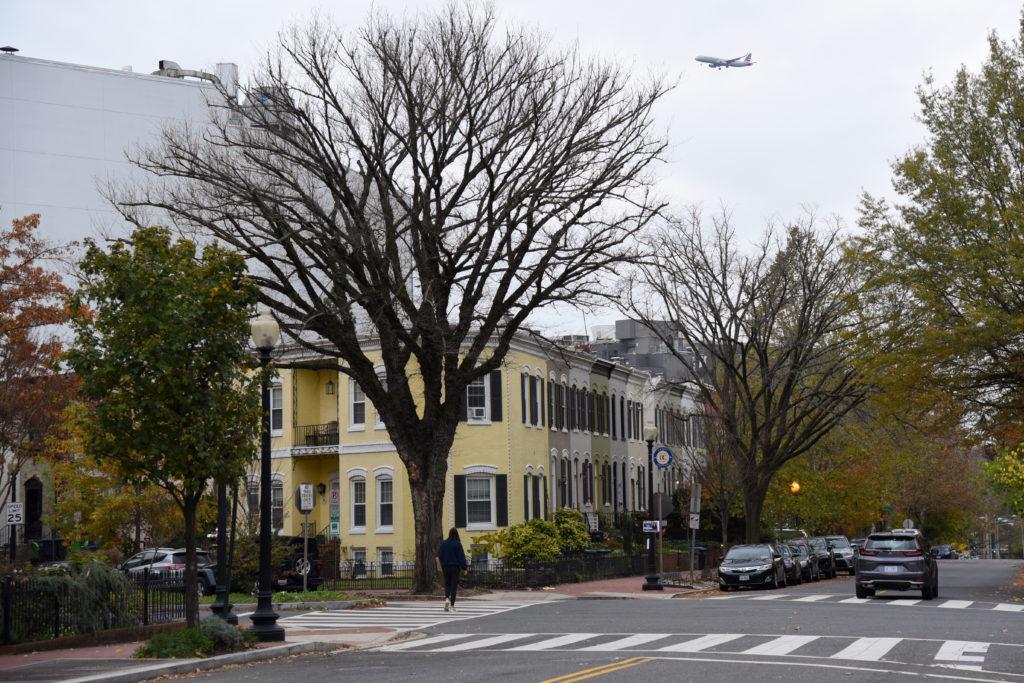Although the University plans to welcome more students back to campus this spring, officials expect off-campus students to outnumber on-campus residents by hundreds.
After administrators announced plans to continue online classes into the spring as the COVID-19 pandemic continues, they offered students to apply for an additional 1,500 openings for on-campus housing last month. But thinking GW would quickly deplete room openings, more than 10 students said they looked for off-campus housing instead.
University spokesperson Crystal Nosal said only 1,100 students applied for spring housing. With 500 students living on campus this semester, officials expect about 1,600 in total to occupy more than nine residence halls in the spring.
Nosal said officials expect the number of students living off campus during the spring to more than double the total number of new on-campus residents. She said 2,300 undergraduates will likely live off campus next semester, just about 200 fewer than the 2,500 students who are typically off campus during a regular school year.
“We anticipate the numbers to remain stable,” Nosal said in an email. “As a reminder, all students are required to update their mailing address based on their living semester for the current semester.”
Those totals would raise the number of students living in Foggy Bottom to nearly 4,000 – more than one-third of the entire student population. D.C. Zoning Commission officials have advised first- and second-year students without housing approval and who don’t live within commuting distance to stay out of the District during the spring semester due to health concerns during the COVID-19 pandemic as cases continue to rise.
Students detailed plans last month to travel to D.C. ahead of the spring to move into either on-campus residence halls or off-campus apartments to regain a semblance of the normalcy of a regular college experience.
University President Thomas LeBlanc said at a Faculty Senate meeting earlier this month that about 140 students who received a spring housing assignment declined the option, which Leblanc attributes to climbing COVID-19 cases.
Henry Huvos, a freshman from Boston who studies political communication, said he and his friend from Arizona, who also goes to GW, decided to move to D.C. after officials announced that remote learning would continue. He said he didn’t want to risk missing out on a full semester in the District, so he took it upon himself to find a housing arrangement off campus.
“The email didn’t mention anything about housing, but I was in D.C. at the time for fall break and felt pretty confidently that I did not want to take any chance,” Huvos said. “So I messaged a friend of mine, and we began looking for apartments/hotels. By the time the lottery system was announced, we had found our place.”
Huvos said he considered applying for the housing lottery but ultimately opted out because he assumed a steep number of applicants would weaken his chances of on-campus approval.
“We didn’t want a situation where one of us got housing and the other didn’t,” he said.
Rachel Chambers, a freshman from Austin, Texas, said she plans to live in an apartment off campus with two other roommates from GW this spring. Although she initially hoped to live on campus, Chambers said she figured the lottery system would leave her with slim chances of getting into a residence hall.
“I initially was hoping to do on campus, but as soon as they said that it was going to be a lottery, I felt like a lot of people were going to apply and I just didn’t feel like I was going to get a spot,” she said.
Chambers said she also refrained from applying for on-campus housing because she wanted to allow students living in extenuating circumstances at home, who received priority housing in the fall, to have better access to spring housing. She said on-campus COVID-19 restrictions also dissuaded her from applying for a residence hall room.
“I was considering that it would be very strict with what went on in the dorms and stuff like that, and I was confident in my own abilities to handle COVID appropriately, and I didn’t really want to be very restricted,” she said.
Chambers said she and her roommates still intend to isolate themselves from the nearby community, and the group drafted a “COVID contract” to restrict themselves to a “pod” of one or two friends and to only leisure in open spaces outdoors.
Emma Carbone, a freshman from New York who opted to live off campus, said she decided to live in D.C. this October when she visited her friend living on campus. After realizing she didn’t want to leave D.C., Carbone said she extended her stay from two to four weeks and began the hunt for an off-campus living accommodation.
When Carbone heard the news about on-campus housing for the spring semester, she said she was already waiting to meet the subletter of an apartment near campus.
“I decided since I found such an ideal apartment that I didn’t want to risk losing that deal and apply for on-campus housing,” she said.
Brennan Fiske, Isibhakhome Ijewere and Yutong Jiang contributed reporting.







